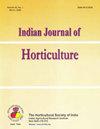热应激诱导的木瓜基因型生理生化变化
Q4 Agricultural and Biological Sciences
引用次数: 0
摘要
低温胁迫显著影响植物生理过程,诱发植物生长障碍,降低作物产量。本研究旨在了解5个木瓜基因型(Pusa Nanha、Red Lady、P-9-5、P-7-9和1个野生近缘种Vasconcellea cundinamarcensis)在低温胁迫下的生理化学行为。低温胁迫显著降低了所有基因型木瓜的冠层气体交换参数、相对含水量(RWC)、膜稳定性指数(MSI)和叶绿素含量,同时增加了总可溶性糖、脯氨酸和总可溶性蛋白含量,但这种变化具有基因型特异性。与其他基因型相比,紫花苜蓿的RWC、MSI、可溶性总蛋白、叶绿素和脯氨酸含量均保持在最高水平,对P-9-5和P-7-9的低温胁迫耐性较强。结果表明,叶绿素含量、膜脂过氧化和MSI可作为筛选潜在抗寒型木瓜的指标。本文章由计算机程序翻译,如有差异,请以英文原文为准。
Thermal stress-induced physiological and biochemical alterations in papaya genotypes
Low-temperature stress significantly affects physiological processes inducing plant growth hindrance,and reducing crop productivity. The present study aimed to understand the low-temperature stress inducedphysio-chemical behaviour of five papaya genotypes (Pusa Nanha, Red Lady, P-9-5, P-7-9 and one wild relativespecies Vasconcellea cundinamarcensis). Low temperature stress significantly decreased the canopy gasexchange parameters, relative water content (RWC), membrane stability index (MSI) and chlorophyll contentin all the papaya genotypes, while tending to increase the total soluble sugars, proline and total solubleproteins, although the alterations were genotype-specific. V. cundinamarcensis showed greater tolerance tolow-temperature stress followed by P-9-5 and P-7-9 than other genotypes by maintaining the highest RWC,MSI, total soluble proteins, chlorophyll and proline contents. Our results showed that the chlorophyll content,membrane lipid peroxidation and MSI could be used as the indices for the screening of potential papayagenotypes against cold tolerance.
求助全文
通过发布文献求助,成功后即可免费获取论文全文。
去求助
来源期刊

Indian Journal of Horticulture
农林科学-园艺
CiteScore
0.50
自引率
0.00%
发文量
22
审稿时长
4-8 weeks
期刊介绍:
Information not localized
 求助内容:
求助内容: 应助结果提醒方式:
应助结果提醒方式:


